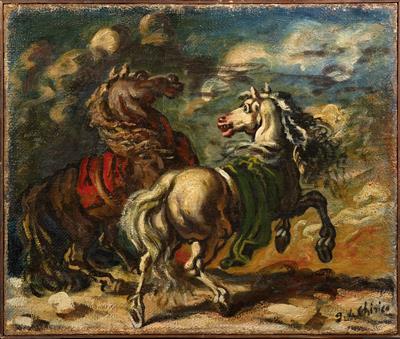Giorgio de Chirico *

(Volos, Greece 1888–1978 Rome)
Due cavalli, 1938, signed, signed again on the reverse with notary inscription, oil on canvas, 51.5 x 62 cm, framed
Provenance:
Galleria Narciso, Turin
Private collection, Milan
European private collection
Literature:
Claudio Bruno Sakraischik, Giorgio de Chirico, Catalogo Generale, Milan 1971, vol. II, no. 118
Giorgio de Chirico, frequently dubbed Pictor Optimus, has become a controversial figure through his work and his strong-willed, energetic charisma. He believed, “in order to become immortal, a work of art must always go beyond the limits of humanity without worrying about common sense or logic.” His legacy looms large.
De Chirico’s work drew heavily on classical influences. He was a modern master of his craft, producing baroque paintings inhabited by figures on horseback and mighty steeds, by Mediterranean landscapes and bastions. He juxtaposed the ochre and pastel colours of his childhood with colder and more rational shades typical of Northern Europe. The work on display here, “Riders in a Village”, painted in around 1952, expresses the artist’s dialectical use of nostalgic memories of his Greek homeland, with its glorious past, and his estrangement from the harsh reality of the post-war period. The horse, a recurring theme in De Chirico’s work, is a small-format, twentieth-century reappropriation of great seventeenth-century painting (Rubens, Van Dyck) (to which De Chirico had referred at least since the still lifes with watermelons and armour of 1922–23) It is a stylistic model, enhanced by the “sprezzature” of the brush strokes. Adopted for its vitality, the horse is no longer a simple steed for human use, but is instead related to man. Beyond beauty, De Chirico's horses express the freedom and power inherent in nature.
30.11.2021 - 18:00
- Prezzo realizzato: **
-
EUR 76.800,-
- Stima:
-
EUR 40.000,- a EUR 50.000,-
Giorgio de Chirico *
(Volos, Greece 1888–1978 Rome)
Due cavalli, 1938, signed, signed again on the reverse with notary inscription, oil on canvas, 51.5 x 62 cm, framed
Provenance:
Galleria Narciso, Turin
Private collection, Milan
European private collection
Literature:
Claudio Bruno Sakraischik, Giorgio de Chirico, Catalogo Generale, Milan 1971, vol. II, no. 118
Giorgio de Chirico, frequently dubbed Pictor Optimus, has become a controversial figure through his work and his strong-willed, energetic charisma. He believed, “in order to become immortal, a work of art must always go beyond the limits of humanity without worrying about common sense or logic.” His legacy looms large.
De Chirico’s work drew heavily on classical influences. He was a modern master of his craft, producing baroque paintings inhabited by figures on horseback and mighty steeds, by Mediterranean landscapes and bastions. He juxtaposed the ochre and pastel colours of his childhood with colder and more rational shades typical of Northern Europe. The work on display here, “Riders in a Village”, painted in around 1952, expresses the artist’s dialectical use of nostalgic memories of his Greek homeland, with its glorious past, and his estrangement from the harsh reality of the post-war period. The horse, a recurring theme in De Chirico’s work, is a small-format, twentieth-century reappropriation of great seventeenth-century painting (Rubens, Van Dyck) (to which De Chirico had referred at least since the still lifes with watermelons and armour of 1922–23) It is a stylistic model, enhanced by the “sprezzature” of the brush strokes. Adopted for its vitality, the horse is no longer a simple steed for human use, but is instead related to man. Beyond beauty, De Chirico's horses express the freedom and power inherent in nature.
|
Hotline dell'acquirente
lun-ven: 10.00 - 17.00
kundendienst@dorotheum.at +43 1 515 60 200 |
| Asta: | Arte moderna |
| Tipo d'asta: | Asta in sala con Live Bidding |
| Data: | 30.11.2021 - 18:00 |
| Luogo dell'asta: | Wien | Palais Dorotheum |
| Esposizione: | Online |
** Prezzo d’acquisto comprensivo dei diritti d’asta acquirente e IVA
Non è più possibile effettuare un ordine di acquisto su Internet. L'asta è in preparazione o è già stata eseguita.
